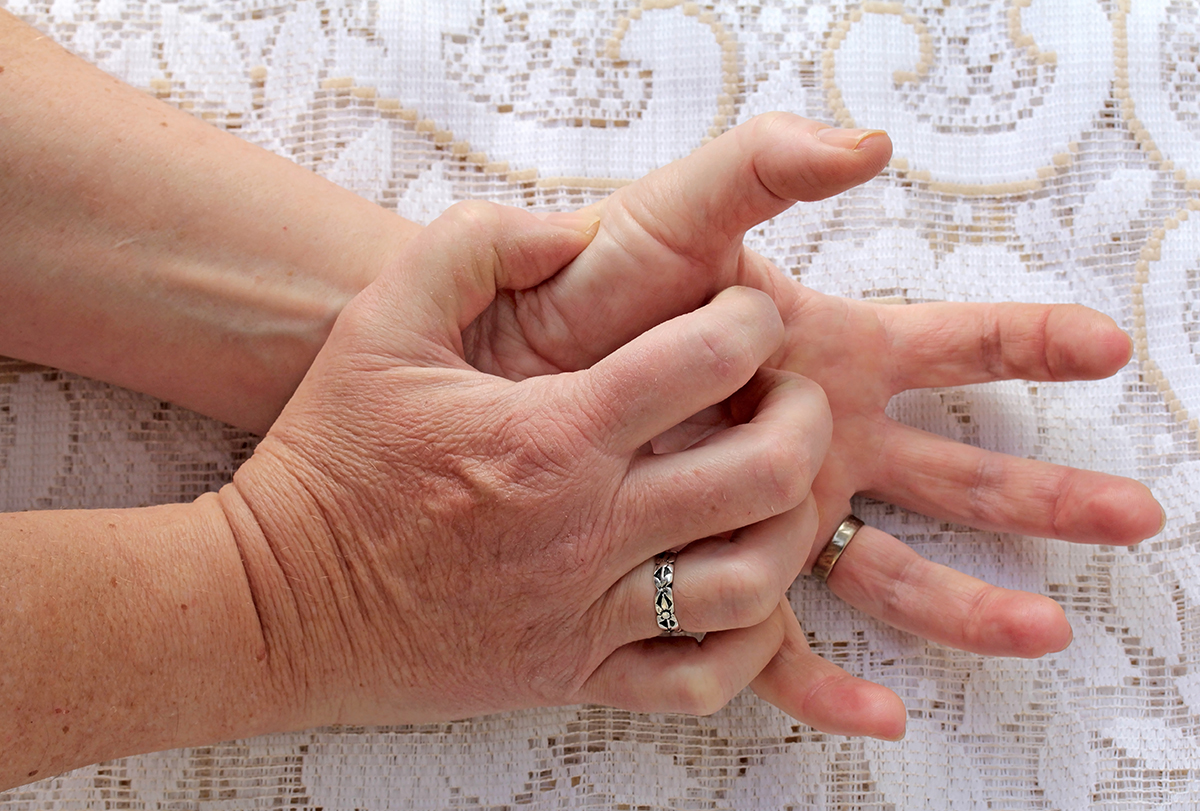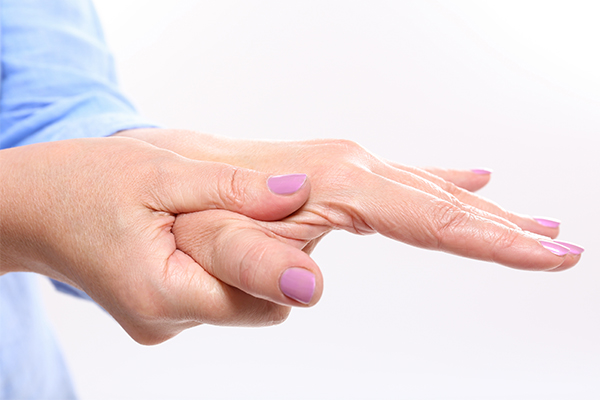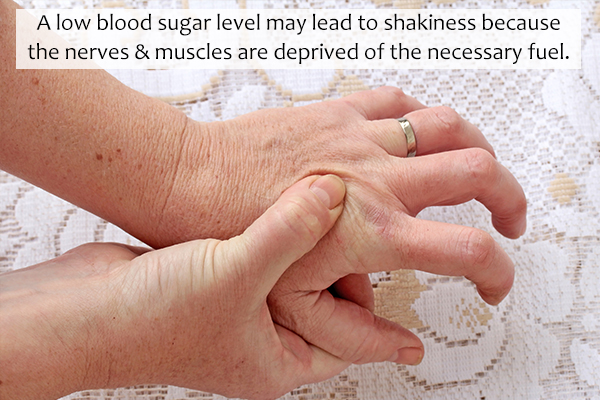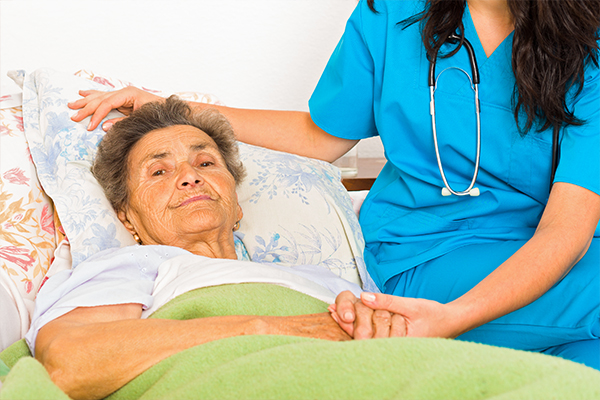In this article:
Hand tremors refer to involuntary and rhythmic shaking of the hands. However, the most common hand tremors are essential tremors and occur in healthy people.

What Causes Shaky Hands?
Shaky hands, abnormal hand movements, and trembling are involuntary movements that are referred to as tremors in medical language. A tremor can be caused by a number of things:
- The manifestation of a neurological disorder (Parkinson’s disease, essential tremors)
- Medical disorder (hyperthyroidism)
- A side effect of medications (anti-arrhythmic, anti-epileptic, asthma treatments, etc.)
- Reaction to extreme emotions (fear, excitement)
Different Kinds of Tremors

Tremors are of different types:
1. Rest tremors
They occur during resting position and usually disappear with activity. Parkinson’s disease is the most common cause of rest tremors.
2. Action tremors
Action tremors occur during voluntary activity and are further subdivided as:
- Kinetic tremor: It occurs during movements such as closing and opening of eyes or moving the wrist up and down.
- Postural tremor: It refers to shaking due to maintaining a posture against gravitational force, such as arms stretched straight away from the body.
- Isometric tremor: It is caused by muscle contraction against a stationary object.
- Essential tremor: It is generally a nerve disorder that causes tremors without any identifiable triggers. Essential tremor is an inheritable condition and is associated with different psychosocial issues.
- Physiologic tremor: It is the most common cause of action tremor and generally manifests from treatable etiologies such as medicine side effects, stimulants, emotions, and fever.
3. Functional tremors
Functional tremors can be seen at rest as well as during action. Functional tremors cause uncontrollable shaking but usually become less apparent with distraction.
Best Ways to Deal With Shaky Hands
Shaky hands can generally be managed by avoiding the triggers. This can be done with the help of the following measures:
1. Control your stress level
High levels of anxiety, stress, and even excitement trigger the release of adrenaline, aggravating the impact of shaky hands and tremors.
2. Do hand exercises
Performing bodyweight exercises to strengthen the muscles in your hand can lower the intensity of hand tremor. It is best to do this under expert guidance.
3. Avoid caffeine
Caffeine can worsen the symptoms of tremors as well as shaky hands.
4. Say no to drinking and smoking
These have a negative impact on brain functioning, thus increasing the risk of tremors.
Lifestyle Changes to Stop Hand Tremors
You can adopt various changes in your lifestyle to help control psychological hand tremors, including:
- Stress management
- Managing emotions
- Reducing stimulant intake (caffeine, sugars)
Can Tremors Be Cured Permanently?
Treatment of tremors, in general, is symptomatic and may not be curative. When possible, treatment of the underlying disorder is the first choice.
- Rest tremors associated with Parkinson’s disease are usually treated with medications for the same. (1)
- Enhanced physiologic tremors are commonly treated with either changing the dose or stopping or switching the responsible medication or toxic agent.
- Essential tremors are generally treated by symptomatic medications.
- Cerebellar tremors don’t respond to pharmacological treatments. Surgical treatments are reserved for refractory cases. (2)
Physical and occupational therapy is important in the management of refractory and disabling tremors to identify coping mechanisms and compensatory strategies.
Does the Problem of Shaky Hands Affect Only Adults?
The incidence of tremor increases with age. However, tremors can be seen in the pediatric population also. Essential tremor can present itself during childhood and early adulthood.
Can Low Blood Sugar Levels Cause Shaky Hands?

Optimal glucose levels in the body are required for the proper functioning of the brain and nervous system. A low blood sugar level may lead to shakiness because the nerves and muscles are deprived of the necessary fuel. (3)
Moreover, a lack of glucose, or hypoglycemia, triggers a stress response in the body, aggravating your shakiness.
Are Shaky Hands a Sign of Anxiety and Panic?
In some cases, shaky hands may result from panic and anxiety. Such extreme emotions exacerbate physiologic tremors (action tremors).
Can Stroke Lead to Hand Tremors?
Tremors usually result from problems in brain parts that control movement. For instance, cerebellar tremors are caused by damage to the cerebellar outflow pathway due to a stroke. (4) This causes high-intensity tremors of the extremities after a voluntary movement.
Demyelination disorders and brain injuries can also cause the same.
What Is Typical About Tremors Caused by Parkinson’s Disease?

The rest tremor in Parkinson’s disease is usually unilateral and affects one hand or leg. Parkinson’s disease is one of the differential diagnosis considerations for patients being evaluated for hand tremors.
What Interesting Observations While Treating a Patient With Hand Tremors Can You Share?
Several patients with essential tremor have mentioned that their tremors improved with alcohol intake.
What Extra Information Will You Like to Give Regarding Hand Tremors?
Usually, movement disorders such as tremors do disappear during sleep. So, if patients are experiencing abnormal movements while asleep, an alternative diagnosis needs to be considered.
Final Word
Shaking of the hands, while common, in some cases may be indicative of neurological conditions such as Parkinson’s disease. Therefore, it is best to consult a doctor if your hand tremors are prolonged or frequent for a proper diagnosis and treatment.
- Was this article helpful?
- YES, THANKS!NOT REALLY


